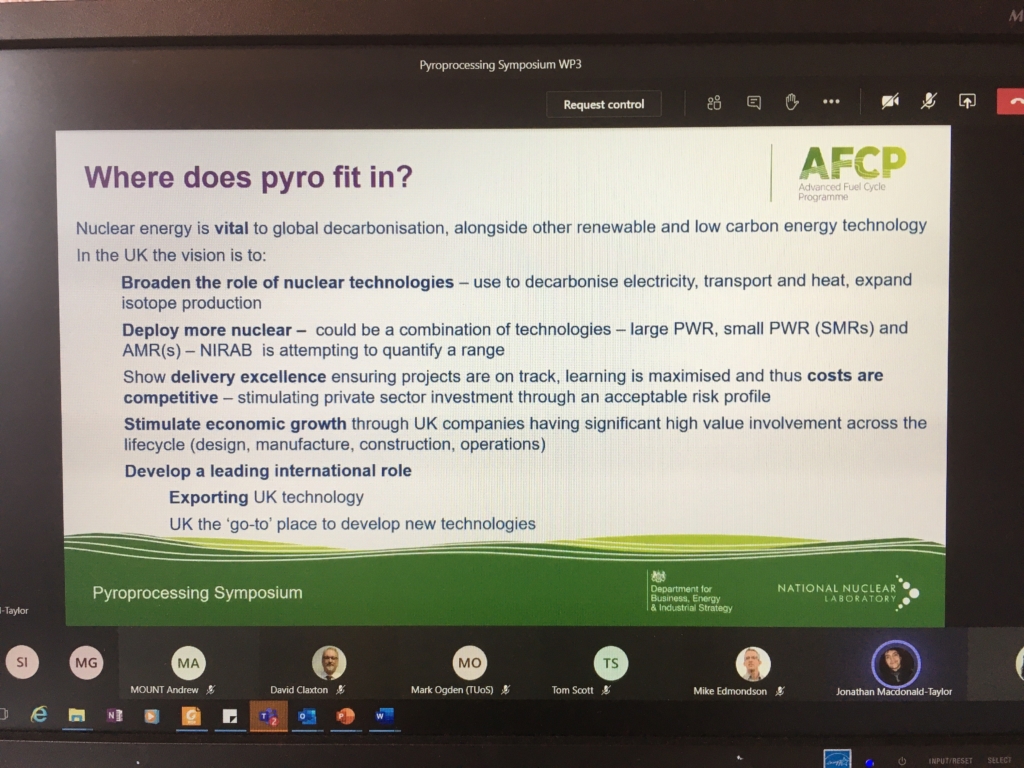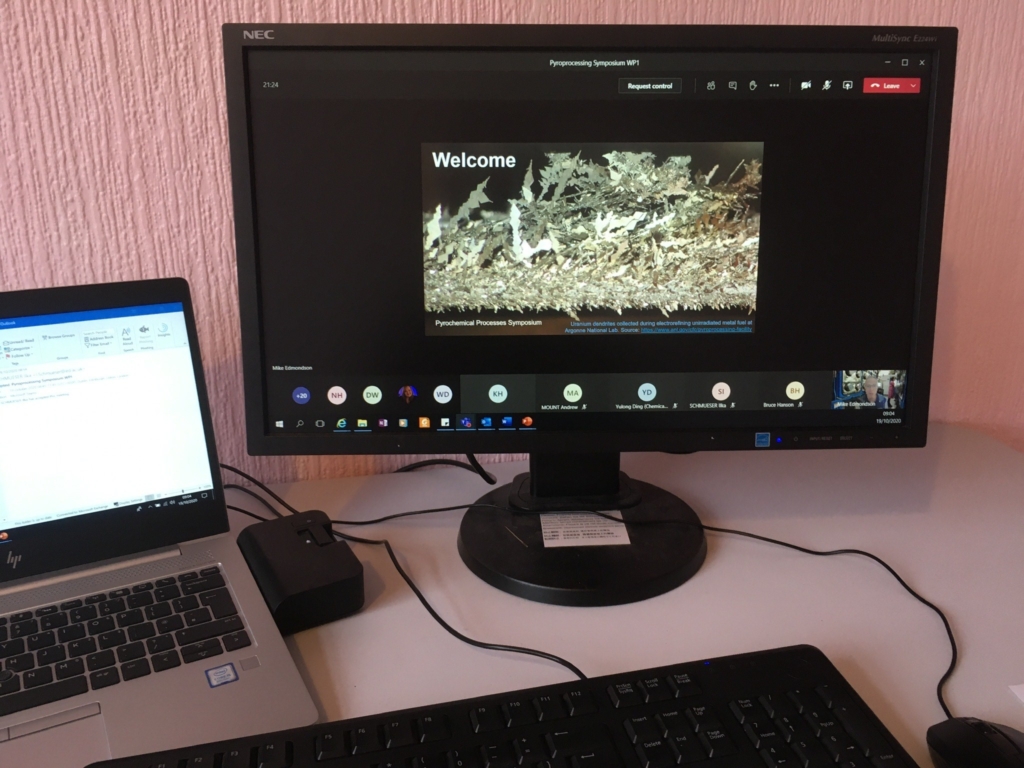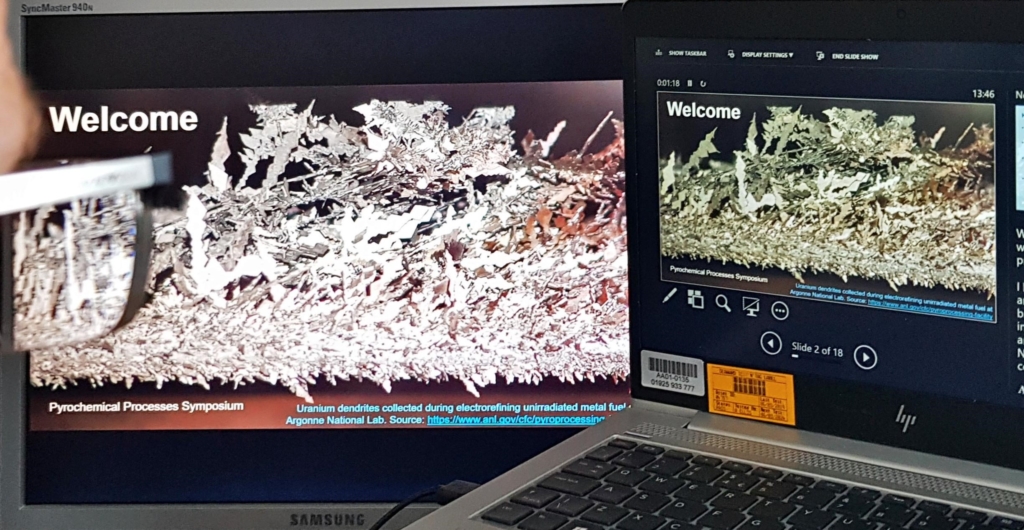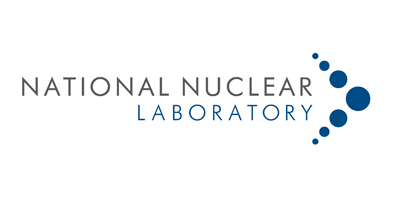AFCP pyro university engagement heats up
AFCP recently held an inaugural symposium to foster collaboration and share work across its pyro-processing project. Between 19 and 23 October, representatives from ten universities, the National Nuclear Laboratory (NNL), the Department for Business, Energy and Industrial Strategy (BEIS) and the Nuclear Innovation and Research Office (NIRO) were online for the virtual event.
AFCP’s Pyro-processing Symposium showcased the range of university pyro-processing projects, exploring how they integrate with one another as part of the programme’s full pyro-processing workstream, as well as their role within wider AFCP ambition of supporting Government’s Net Zero commitment.

Reigniting UK opportunity
Pyrochemical processing – or pyro-processing – uses molten salts and electrochemistry to dissolve spent fuel and separate valuable elements for future reuse. Although the technology has been around since the early days of nuclear industry, there remain significant challenges to the industrialisation of these techniques. Despite these challenges, pyro-processing can offer many advantages if given focused development of modern materials, engineering and science through efforts such as AFCP. Recognising the potential of pyro-processing to support a more sustainable future fuel cycle, UK Government has invested in this study as part of AFCP to re-build UK pyro-processing skills and capability.
One of the more recent projects within AFCP’s eleven technical themes, pyro-processing complements the programme’s range of advanced recycling and sustainability innovation areas. With university contracts now in place, AFCP’s pyro-processing team hosted a week of interaction, discussions and presentations to kick off this exciting area of study.
Innovative digital connections
AFCP’s Pyro-processing Symposium took advantage of technology to overcome the restrictions imposed by the COVID-19 pandemic. The virtual symposium held four formal morning sessions, during which the project’s university partners delivered presentations and Q&A sessions about the scope and proposed solutions of their studies. Project leads from NNL introduced each session, providing context by describing their work at NNL and how the different university contributions integrate into AFCP’s full pyro-processing project.
The innovative afternoon sessions were more fluid, intended to replicate the informal discussions at conferences that take place during poster sessions, coffee breaks or even in the bar! Participants were invited to produce short ‘poster’ presentations – shared before the event – and dialled in to virtual discussions in the afternoon to ask questions and share thoughts with different presenters.
Discussions stimulated in the morning sessions were also carried through to the afternoon, allowing an organic continuation of ideas throughout the week. The symposium’s flexible agendas provided a unique sharing platform for discussion and engagement across the project.

Introducing new pyro partnerships
The primary objective of the symposium was to provide attendees with a broader overview of the AFCP pyro-processing project, enabling teams to identify relevant benefits and future collaborative opportunities for their work packages. It also provided a platform for learning, upskilling those in attendance through the chance to engage with other AFCP pyro-processing experts across the UK.
It was notable that there were many conversations sparked throughout presentations, and we anticipate that dialogue will continue, ideas manifest and collaboration grow as the pyro-processing project evolves. One of the key points that came across was the depth and breadth of knowledge that the programme is tapping into, ensuring that the delivery of this technical theme is in good hands.

Supporting sustainability and skills of the future
The successful delivery of the pyro-processing project will provide the UK with the capability and capacity to assess how and where pyrochemical-based techniques can support not only other AFCP recycle options, but also other emerging technologies such as molten salts reactors and fusion – providing more and better options on our drive to Net Zero.
This symposium has nurtured a new seedbed from which the shoots of a UK capability in pyrochemical techniques are emerging. Continued collaboration will provide a network of knowledge, skills and technologies to ensure the roots of pyro-processing are strong and can provide the capability and innovation needed to weather the challenges we might face ahead in our transition to a more sustainable nuclear fuel future.
We would like to thank all those who contributed to the symposium, whether through presenting on their work, by asking questions or simply for being the future of this exciting project! We hope to hold another symposium in future months to share progress and further interconnect the innovation and collaboration across AFCP’s pyro-processing chapter.
